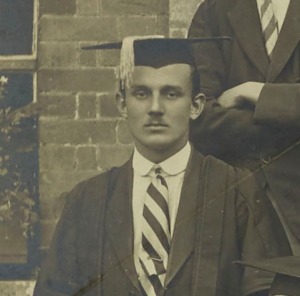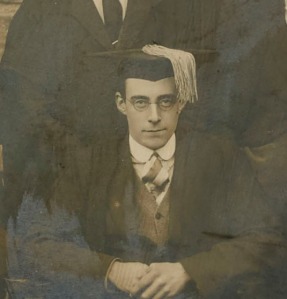The Debating Society is one of the oldest institutions at Radley College. There was certainly a Debating Society under William Sewell in the 1850s, accounts of debates appear regularly in The Radleian from 1866, and the Minute Books of the Society are preserved from 1901. Members were elected to the Society, both at senior and junior level. Membership of the Society was considered a great accolade – most of the leading lights of the school (prefects, games captains) were members – and the Society (with minute book proudly in view) was included in the series of official school photographs which were taken annually by Gillman & Soames of Oxford and displayed prominently in the school library.

Radley College Debating Society, 1919. Several of those identifed here took part in the 1918 debate on women in Parliament
Debates were eagerly anticipated, advertised in the school calendar, and recorded in the school magazine. How much they represented true debate is a moot point (as is always the case with school debating). Similarly, it is unclear quite how much individual debaters believed in the case which they were propounding. However, the four debates on the Women’s Suffrage Movement reveal both entrenched male attitudes which now would be interpreted as verging on the misogynistic and some young men who clearly were aware of the complex arguments surrounding women’s suffrage. It should also be noted that the earliest debate shows they are clearly aware of the injustice of partial male suffrage as well. Perhaps more worrying than reading the development of these young intellects, is the occasional comment from the floor by members of the teaching staff (who also had to be elected to join the Society) such as the breath-taking illogic of the Sub-Warden’s point that women should not have the vote ‘because women are women’. Alongside the debates there are throw-away jokes which appear in the Prologue to the school play, occasional poems, such as ‘A nightmare’ from 1909, and oblique references in other discussions which reflect some of the other issues addressed by the Women’s Movement, such as hobble skirts in a debate about fashion.
| In a debate held in 1907, entitled ‘The decadence of England has begun’, one speaker against the motion ‘ended by asserting that the behaviour of the Suffragettes was not a sign of demoralization, but rather showed progress and development of ideas.’ Also in 1907, the real-life debate over whether soccer or rugby should be the school’s sport was likened to the politics of the suffragist movement in a letter to the Editor of the school magazine. Both the letter and occasional poems, such as ‘A nightmare’ from 1909, present an ambivalent approach. |
Four debates
1908. ”That in the opinion of this House, Female Suffrage would be beneficial to this country.”
The motion was lost by 14 votes to 6.
1910. “That this House approves of the Woman’s Suffrage Movement.”
The motion was carried by 7 votes to 6.
Some good and convincing arguments were adduced, and the Society in some part made up for the delinquencies in the previous debate.
1913. ”That this House is in favour of the extension of the franchise to women”
The motion was lost in the Lower House by show of hands
In the Upper House it was carried by 8 votes to 4
1918. ”This House deplores the entry of women into Parliament
The debate
|
The Hon. Proposer’ (E. J. N. Wallis) said that he took up his task with trepidation, but he was quite convinced himself, and had very strong opinions on the subject. It was folly that that Parliament, which had listened to Pitt, Burke, Disraeli, Gladstone, and other great men, should receive within its walls women, whose special duty has always been to bear children and take care of the home. Let her continue in that work! He said that although women had done splendidly in this war, they had never undertaken any administrative work. It was only by necessity of war that they had made munitions or driven trams. The true essence of womanhood had always been one of the brightest lights in this dark world. Homer said that the woman should stay at home, spin, and weave. Woman would not be in her right place in Parliament, and so she would not be a success. In conclusion he remarked that he ranged himself on the side of all the poets and philosophers, Homer, Aeschylus, Plato, Dante, Chaucer, Shakespeare. |
|
|
The Hon. Opposer (H. G. C. MaIlaby) said that it was only through prejudice that we objected to women being in Parliament, but that as “The old order changeth, yielding place to new,” now was a fine opportunity for giving women an effective say in the deliberations of Parliament. A vote was not enough it would not do to give them only half what they deserved. They could be as provident, prudent, wise, and as eloquent as men. Through women we had won the war, and they richly deserved a reward for their patriotism and devotion, and henceforth they ought to have a say in ruling the country. He suggested that an Election Committee of unprejudiced persons should be set up to select suitable women candidates. This committee would not choose women who dressed atrociously, or who would be likely to make scenes, or disrespect the traditions of Parliament. ‘ |
|
W. B. K. Shaw, rising to support the Hon. Proposer, drew attention to the results of the entry of women into a Parliament of a democratic state, whose constitution might resemble our own. In Norway women had agitated until nearly all Government offices were open to them. He said that the same thing might happen in England, and imagined women sitting on the Treasury Bench. He agreed with the Hon. Proposer that they would be out of their sphere, and consequently could not be efficient members of the Hous |
|
|
The Hon. Secretary (G. P. Murray) argued that as women had proved themselves capable in making munitions and driving trams, so they would prove themselves capable in Parliament. |
|
L. Cooper thought we should consider cases, such as Educational problems, in which women were as interested as men. The entry of women into Parliament would prevent men governing the country {or their own interests. He pointed out the ill effects of the rigorous control of women in Germany, and said that a German professor had laid stress on woman’s adherence to tradition. But, he argued, Parliament is much governed by tradition and women would not let down that tradition. |
|
A. F. H. Godfrey, said he thought that the entry of women into Parliament would destroy the courtesy towards women. |
|
|
The President (J.M.Hawker) said that parliament had changed considerably of recent years and as there were Nationalists and Labour members there to look after their interests, so there ought to be women there to look after their interests. After the war the Government would be formed of different branches, and women certainly ought to be represented on the Domestic branch. He said that History gave examples of many great women. Queen Elizabeth had wonderful powers. Some women were as gifted as men. The Czarina had been very skilled in domestic matters, but she could not keep out of political questions and there she failed. He pointed out that all the poets and philosophers mentioned by the Hon. Proposer were men, and that female writers, Charlotte Bronte for example, were in favour of women having as much power as men. |
The motion was carried in the Upper House by 3 votes to 2.
The motion was carried in the Lower House by a show of hands.









